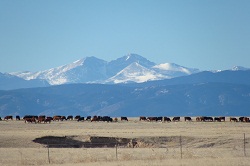|

Colorado |
Color me skeptical but I think it’s unlikely the sequestration theory/plan produces the desired outcome.
Doubts about the theory are beginning to emerge.
In a recent study, scientists at Princeton University devised a series of experiments that allowed them to observe how carbon molecules stick—and unstick—to clay, a key element in soil that retains carbon.
Scientists have long known that microbes release some carbon in the process of decomposing organic matter in soil. But the long-held assumption is that clay can counteract that by binding with carbon and protecting it from microbial activity. The new findings, published on Wednesday in Nature Communications, challenge how reliable that assumption is.
First, lead author Judy Yang incubated carbon molecules, common soil bacteria, and tiny clumps of clay, formally referred to as clay aggregates, in a petri dish. Under a microscope, she discovered that over time, the bacteria were too large to penetrate the clay, and thus, they were unable to directly access the carbon stored within. That’s the good news—it means the microbes were prevented from breaking down the carbon molecules and releasing them back into the atmosphere.
However, in a separate experiment, Yang introduced enzymes—proteins released by bacteria and fungus to help them process food—into a modified microscope slide containing clay and carbon molecules. Enzymes are significantly smaller than bacteria, and for that reason, they were not only able to penetrate the clay structures, but actually helped release nearly all of the carbon molecules inside within hours. Once carbon is freed from clay aggregates, it becomes accessible to soil bacteria again, which can release it from the ground over time. This process could potentially render soil sequestration a more temporary carbon sink than expected.
“Maybe the great carbon storage potential that people think is out there is not permanent as they had anticipated.”
https://thecounter.org/soil-sequestration-carbon-farming-biden-clima...
| |
|


 Land O' Lakes and Mircosoft want your Carbon
Land O' Lakes and Mircosoft want your Carbon